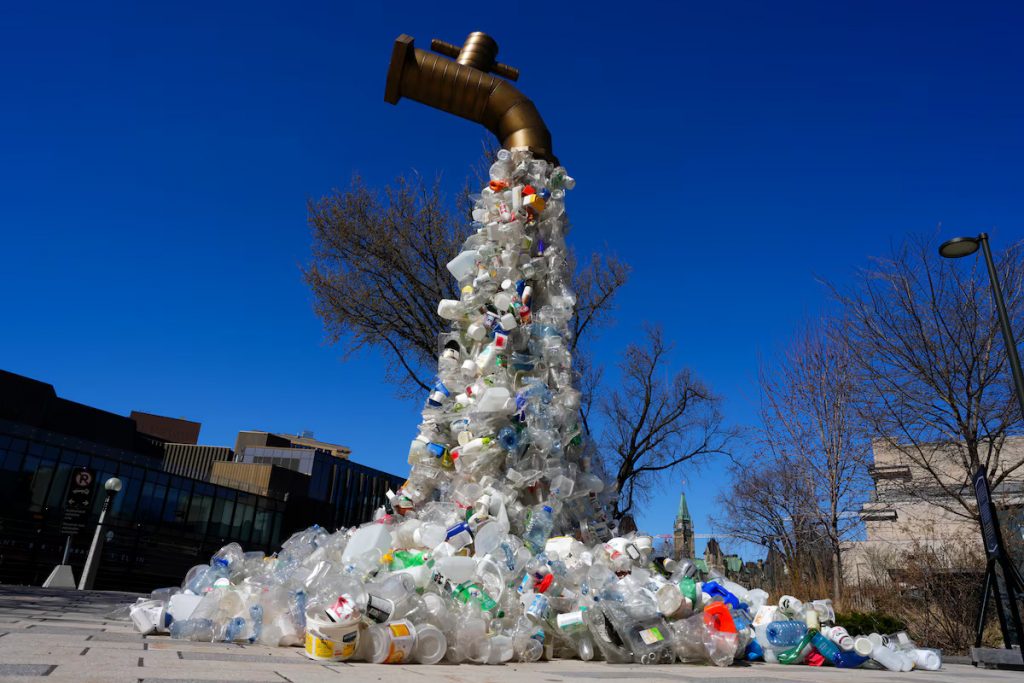Plastic pollution and climate change have common culprits – and similar solutions. [Jack Marley, energy and environment editor, The Conversation]
.
There is seemingly good news coming out of the UN this week, with negotiations on a global plastics treaty closing in Ottawa:
The fourth session of the Intergovernmental Negotiating Committee to develop an international legally binding instrument on plastic pollution, including in the marine environment (INC-4), concluded today in Ottawa with an advanced draft text of the instrument and agreement on intersessional work ahead of the fifth session (INC-5) in November.

However, the wider media is not so impressed, with the Guardian reporting that developed countries are accused of bowing to lobbyists at the plastic pollution talks:
Campaigners are blaming developed countries for capitulating at the last minute to pressure from fossil fuel and industry lobbyists, and slowing progress towards the first global treaty to cut plastic waste. Delegates concluded talks in Ottawa, Canada, late on Monday, with no agreement on a proposal for global reductions in the $712bn (£610bn) plastic production industry by 2040 to address twin issues of plastic waste and huge carbon emissions. They agreed to hold more discussions before the last summit on the treaty in Busan, South Korea, in November.
But two years on from a historic agreement in Nairobi to forge a global treaty to cut plastic waste, delegates said countries were just wasting time. A proposal from Peru and Rwanda to address for the first time the scale of plastic production in order cut waste was supported by 29 countries including Australia, Denmark, Nigeria, Portugal, the Netherlands and Nigeria, who signed a declaration, “the Bridge to Busan”, calling on all delegates to ensure plastic production was addressed. The UK and US did not support the proposal to cut plastic production.
But it’s not just the Guardian, with the view from India saying that the plastic treaty talks conclude in Ottawa with little progress and from France that the UN-led talks wrap up without a deal on capping plastics production.
The Conversation as always gives some excellent analysis – and in his weekly Imagine piece, Jack Marley, energy and environment editor, shows that plastic pollution and climate change have common culprits – and similar solutions.
Plastic pollution and climate change have common culprits – and similar solutions.
The penultimate round of negotiations for a global pact on plastic ended yesterday in Ottawa. Nearly 200 countries have agreed that a treaty must tackle plastic pollution at every stage of its existence, from oil rigs and refineries to factories, shops and homes. But when Rwanda and Peru proposed cutting the amount of plastic produced worldwide by 40% over the next 15 years, the UN talks faltered.
This stalemate has been, at least partially, engineered by the same companies stalling climate action: fossil fuel firms and their petrochemical partners. Most plastics are derived from fossil fuels. Oil and gas companies extract these fuels and petrochemical firms refine and synthesise plastic from them. Reports suggest that the number of lobbyists representing both industries at the negotiations is increasing.
Reducing plastic production is the most effective way to cut pollution according to a recent study. Since a proposal for phasing down production failed to gain enough support in Ottawa however, it’s unclear what the agreement – expected later this year – will eventually look like. “Will it be ambitious, with strict binding measures focusing on all stages of the plastics life cycle (including the ‘upstream’ stages associated with resource extraction, manufacturing and processing)?” ask Antaya March, Cressida Bowyer and Steve Fletcher, researchers who study the plastic waste epidemic at the University of Portsmouth. “Or will it be a weaker treaty, with voluntary and country-led measures that focus mainly on waste management and pollution prevention (the ‘downstream’ stages)?”
…